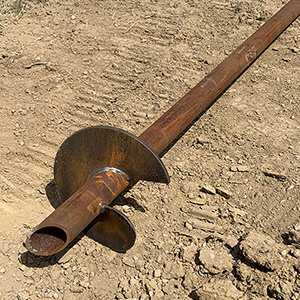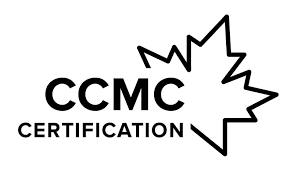How Do Screw Piles Work?
Screw Piles also referred to as helical piers are a deep anchor foundation system. Made up of a long steel tube with a circular offset blade on the end. Screw piles Calgary are installed by turning them into the ground. Pile installation is done with hydraulic drive heads mounted on skid steers or loaders. The drive heads turn the piles which drive the helix into the ground until the desired depth or install torque is achieved.

What is the screw pile helix?
The offset auger blade on the lower end of a screw pile is the helix. The helix is what bears the pile load deep down in the soil. During installation the screw piles are rotated by the drive head and the helix blade screws into the earth. Because of the auger shape of the helix blade, the helix turns through the soil the pile sinks deeper into the ground. The helix supports the load of the pile so it needs to be installed well below the frost line. This prevents the pile from frost heaving. Certified piles require a helix be welded in accordance with CSA W59-13 and be produced by certified welders in accordance with the Canadian Welding Bureau.

What is a certified screw pile?
In Canada for a helical screw pile to be certified it must be engineered and fabricated in conformance with the requirements set by the Canadian Construction Materials Centre (CCMC). CCMC certified piles can be identified with a label that contains the manufacturer’s information, reference to the specified material standards and the phrase “CCMC XXXXX-Râ€. These numbers are only used by pile manufacturers who meet the requirements of the Alberta building code and have also been evaluated by the CCMC.
Some criteria for certified piles are:
- Auger-installed steel piles are to have a helix with an engineered pitch
- Screw pile installers must be certified by the pile manufacturer and use the approved equipment
- Manufacturers installation requirements must be adhered to
- All welds must meet the requirements of CSA G40.20/G40.21 or ASTM A 500
Â
Certified screw piles are approved to be used as a foundation and can be used in many building applications.

What can you build on top of a screw pile foundation?
Common applications in Calgary for helical pile foundations are:
- Residential Decks
- Sheds
- Cement Pads
- Preformed Stairs
- Grade Beams

How do screw piles connect to a structure?
Screw piles connect to a variety of structures using a screw pile cap. The cap goes on top of an installed screw pile. The cap works like an adaptor allowing for various means of attachment.
- Flat caps can accommodate almost all building structures. Like the name suggests, flat caps are a flat plate that supporting structures can sit on. These caps can be bolted or welded. Flat caps are easily the most versatile.
- Adjustable caps have a threaded portion that allows the height of the cap to be changed after the building project has been completed. The downside to threaded adjustable caps is their load capacity is limited.
- Rebar caps are used in concrete grade beam applications. The rebar on the caps can be tied to the rebar in the grade beam. Concrete can then be poured over the caps (installed on the pile) transferring the vertical load of the beam to the pile itself.
These are some of the most common types of screw pile caps. Though the configurations and possibilities are endless. Caps can be fabricated to connect nearly anything to a helical pile.
The new standard in foundations
Screw piles have been around for over a century. And with advancements in engineering and installation technology they have quickly become the new standard in deep ground foundations. Helical screw piles are now the most reliable and economical foundation option. Not only that but they are easy to have installed with no mess or excavation required.
If you wish to have a screw pile foundation installed for your next project. Contact Torsion Screw Piles for a quote today.
Call Now:
(403) 312-1222
